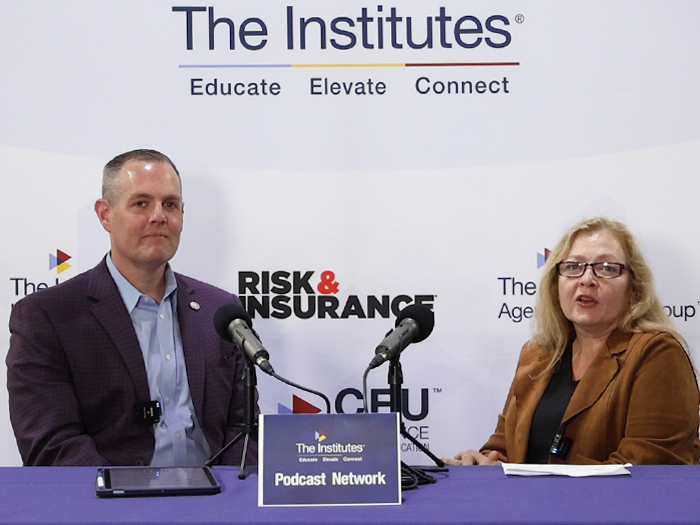View From the Bench
Workers’ Comp Docket

Obtaining Job Under False Name Doesn’t Preclude Benefits
Mera-Hernandez v. U.S.D. 233, No. 112,760 (Kan. 03/24/17)
Ruling: The Kansas Supreme Court upheld the Court of Appeals’ determination that a school custodian was eligible for workers’ compensation benefits despite the fact that she obtained the job using a false name and identification documents.
What it means: Because workers’ compensation laws frequently provide the exclusive remedy for a worker injured on the job, many states, including Kansas, liberally construe the term “employee” when determining eligibility for coverage.
Here, Kansas’ broad definition of employee, which essentially includes anyone who has entered into an employment arrangement with an employer, made an employer responsible for benefits.
Summary: A school custodian’s use of a false name and identification documents to obtain employment with a Kansas school district did not let the district off the hook for workers’ compensation benefits when the custodian injured her back.
Because the custodian fell within the broad definition of “employee” set forth in Kansas’ Workers’ Compensation Act, the district could not exclude her from coverage, the Kansas Supreme Court ruled. It upheld the state Court of Appeals’ decision, which in turn affirmed a determination by the state Workers’ Compensation Board that the custodian was entitled to benefits for her work-related back injury.
The district asserted that because the custodian’s fraudulent conduct induced it to hire her, her employment contract was void from the beginning. Without an employment contract, it argued, she could not recover any benefits under the state’s workers’ compensation system.
Noting that the district’s argument “has been rejected at every level to this point,” the court explained that the definition of “employee” “should be liberally construed to bring workers within the provisions of the Act.”
Under the workers’ compensation law, an employee is “any person who has entered into the employment of or works under any contract of service or apprenticeship with an employer,” the court added. As the custodian fit the broad definition of employee, she was entitled to coverage.
The court also pointed out that in another case it declined to “read a public policy exception based on immigration status into the Act.” Instead determining that because the employee met the statutory definition of employee, she was covered.
Finally, it observed, the state legislature amended the act in 2011 but did not alter the definition of ‘employee.’”
Expert Testimony Connects Employee’s Cancer to Workplace Mercury Exposure
Paradise Valley Unified School District, et al. v. Industrial Commission of Arizona, et al., No. 1 CA-IC 16-0020 (Ariz. Ct. App. 03/28/17)
Ruling: The Arizona Court of Appeals upheld an administrative law judge’s finding that a school district technician’s bladder cancer was caused by exposure to mercury from crushed light bulbs. He was therefore entitled to workers’ compensation benefits for his industrial injury.
What it means: Employers in Arizona should ensure that workers who handle toxic materials are provided with adequate safety equipment, and comply with user manual instructions, as well as applicable state and federal safety regulations.
Summary: A technician for a school district was the primary operator of a “bulb-eater machine” his school district purchased. The machine was used to crush and dispose of all fluorescent bulbs that burned out in the district. The technician testified that he crushed approximately 20,000 bulbs over the course of his employment.
Four years after he started using the machine, he was diagnosed with an aggressive form of bladder cancer. He sought workers’ compensation benefits for his condition. An administrative law judge ruled in his favor, and the district appealed. The Arizona Court of Appeals held that he was entitled to benefits.
The court explained that to secure benefits, the technician had to show not only that his injury arose of his employment, but that industrial exposure to mercury caused him to develop cancer.
He satisfied the first element, legal causation, by demonstrating that operating the machine over a period of years inside a closed warehouse was part of his job duties, the court noted.
According to the ALJ, the court continued, the technician “was exposed to mercury vapor from broken and exploding fluorescent tubes and in fact was covered with dust containing mercury while performing his work.”
As to the second element, medical causation, the court highlighted the testimony of one of the technician’s treating physicians. He testified that the technician was “fairly young” to have bladder cancer and that he lacked any of the “usual risk factors, such as smoking, second-hand smoke, or a genetic predisposition.”
An expert witness added that the paper mask the technician used “did not provide the level of filtration necessary to protect against mercury exposure.” Based on the totality of the evidence, the court held that the technician was entitled to workers’ compensation benefits.
Board Must Take Second Look at Softball Injury After Applying Incorrect Standard
Morris James LLP v. Weller, No. N16A-05-006 FWW (Del. Super. Ct. 03/16/17)
Ruling: The Delaware Superior Court reversed a decision by the Industrial Accident Board finding that a paralegal’s injury during a softball game was compensable and sent the case back to apply the correct standard.
What it means: In Delaware, a worker’s injury during a recreational activity not sponsored by the employer is compensable if it occurred on the employer’s premises, the employer required participation, or the employer derived a substantial benefit beyond the intangible value of improvement in employee health and morale.
Summary: A group of a law firm’s employees decided to form a softball team to compete in the Wilmington Lawyers’ Softball League. The firm paid for the team’s jerseys, bats, and meals after each game.
A bankruptcy paralegal previously managed the team and worked on softball-related activities at work. He left work early to get a cooler and buy beverages for the game.
During the game, the paralegal was running around the bases when his Achilles tendon ruptured. The controller of the law firm suggested that he file a workers’ compensation claim. The law firm’s carrier denied the claim.
Later, the Industrial Accident Board determined that the paralegal’s injury occurred within the course and scope of his employment. The law firm argued that the board applied the incorrect standard. The Delaware Superior reversed the board’s decision and sent the case back for it to apply the correct standard.
The board found that the Wilmington Lawyers’ Softball League, not the law firm, sponsored the softball games. The court found that the board applied factors that apply to a company-sponsored recreational event.
The court said that a different standard applies when a recreational event is not sponsored by an employer. A worker’s injury during a recreational activity not sponsored by the employer is compensable if it occurred on the employer’s premises, the employer required participation, or the employer derived a substantial benefit beyond the intangible value of improvement in employee health and morale.
The court pointed out that only one of the factors must be satisfied to support a finding that an injury is compensable. Also, the third factor requires an employer to derive a “substantial benefit” form the activity.
The court said that in the context of a recreational event, such as a softball game, a direct benefit to an employer includes business advertising, publicity, and monetary gain.
School Employee Scores Benefits for Wipeout During Senior Prank Day
Field v. Pinckneyville Community H.S. Dist. 101, 25 ILWCLB 12 (Ill. W.C. Comm. 2016)
Ruling: The Illinois Workers’ Compensation Commission awarded a teacher permanent partial disability benefits based on 35 percent loss of use of the left leg and medical expenses of $80,791 for injuries sustained while walking from her vehicle to the building where she worked.
What it means: In Illinois, when a teacher parks in an area that is much farther away than the normal area because students are participating in a senior prank day by blocking teachers from parking in their customary parking spaces, the prank day is implicitly approved by the school administrators, and the blocking of the teachers from parking in their customary parking spaces is a known activity, the teacher was within the scope of her employment.
Summary: A high school art teacher testified she was en route to her employer when she found the entrances to the school parking lot were blocked off by vehicles as part of a senior prank day. Therefore, she parked next to the football practice field, which was across a side street that bordered the school.
As she walked across the morning grass, she fell and fractured her lower left leg. The grass was not flat but had a slight decline from the sidewalk to the parking lot. The arbitrator found the teacher’s accident arose out of and in the course of her employment and awarded benefits.
The arbitrator noted that although the teacher parked in a spot that was much farther away from her customary parking space, it was the most direct route from her car to the school doors.
The school tradition of Senior Prank Day was not a school-sponsored event, but it was implicitly approved by the school administrators, and the blocking of the teachers from parking in their customary parking spaces was a known activity.
Accordingly, the teacher was within the scope of her employment when she parked across the street from the school.
After she parked, the teacher took the most direct route from her car to the school doors while maintaining a distance from the students, their music, and their vehicles.
The teacher testified that although she was not scared of the students, she was focused on their activities and desired to avoid close contact. She was not sure whether she slipped on the morning grass or tripped in an unseen hole.
Under these circumstances, she, as a teacher and therefore an intended target of the prank, experienced an increased risk of harm than that of the general public. Furthermore, her choice of route across the mowed grass and away from the students and vehicles was reasonable.
Upon review, the commission affirmed and adopted the decision of the arbitrator.
Suit for Injuries Resulting From Stroke at Work Moves Forward
Baiguen v. Harrah’s Las Vegas, LLC d/b/a Harrah’s Casino Hotel, et al., No. 70204 (Nev. Ct. App. 02/28/17)
Ruling: The Nevada Court of Appeals reversed a grant of summary judgment to an employer on a worker’s suit. The evidence did not show that the worker’s injuries arose from his employment.
What it means: In Nevada, a worker’s injury arose from his employment when there is a causal connection between the injury and the nature of the work or workplace.
Summary: A worker for Harrah’s Casino Hotel suffered a stroke sometime between driving to work and prior to the start of his shift. His coworkers saw him exhibiting signs of distress in the parking lot and the clocking-in area before work, but nobody realized that his condition was as serious as a stroke.
A group of coworkers drove him home, where he remained unattended for two days and eventually suffered permanent injuries. The worker sued Harrah’s for negligence, claiming that its failure to render him timely medical aid reduced his chances of avoiding permanent harm from the stroke. Harrah’s sought summary judgment, arguing that the worker’s sole remedy was workers’ compensation.
The District Court granted summary judgment to Harrah’s, finding that the suit was barred by the exclusive remedy of the workers’ compensation law. The Nevada Court of Appeals reversed.
The court found that the worker’s injury occurred during the course of employment. He was on the premises of his place of employment and was proceeding to work when he experienced the stroke.
The court found that the facts of the case raised a question regarding whether the risk of the worker’s injuries were personal and neutral. The court determined that the worker’s injuries did not arise from his employment.
If the risk was personal, he would have suffered the stroke regardless of his employment. If the risk was neutral, the record did not show that his work duties or the working conditions increased the risk of the stroke.
Clerk’s Claim For Depression Not Barred
Wilson v. Charleston County School District, No. 5475 (S.C. Ct. App. 03/22/17)
Ruling: The South Carolina Court of Appeals held that a clerk’s change of condition claim was not barred by the doctrine of res judicata and was filed within the 12-month deadline.
What it means: In South Carolina, a change of condition claim for depression is not barred by res judicata when the depression was not raised in the worker’s initial claim.
Summary: A data clerk for a school district was a bystander to a fight between two students. The students inadvertently pushed into her and pinned her against a marble countertop, which resulted in injuries to her neck and back.
The clerk received workers’ compensation benefits. Later, she filed a claim alleging a change of condition, asserting that her back injury was affecting her mental health. The clerk had been diagnosed with endogenous depression.
The school district argued that the claim was barred by the doctrine of res judicata and was not timely filed. The South Carolina Court of Appeals held that the clerk’s change of condition claim was not barred by the doctrine of res judicata and was filed within the 12-month deadline.
The doctrine of res judicata ensures that no one is sued twice for the same cause of action. Here, the clerk experienced prior episodes of depression following her husband’s death and an episode related to anxiety.
However, she said that she did not experience significant depression until pain from her back injury increased significantly. No doctor opined that she had work-related depression before the initial hearing.
The court found that the evidence showed that the clerk’s psychological condition worsened after the initial hearing and before she filed her claim alleging the change of condition. The clerk did not raise the issue of depression in her initial hearing. At that time, it had not progressed to endogenous depression. Therefore, the claim was not barred.
The court also found that the clerk satisfied the requirement that a claim be filed within a 12-month deadline. She filed the notice of claim alleging a change of condition within 12 months of her last payment of compensation.










